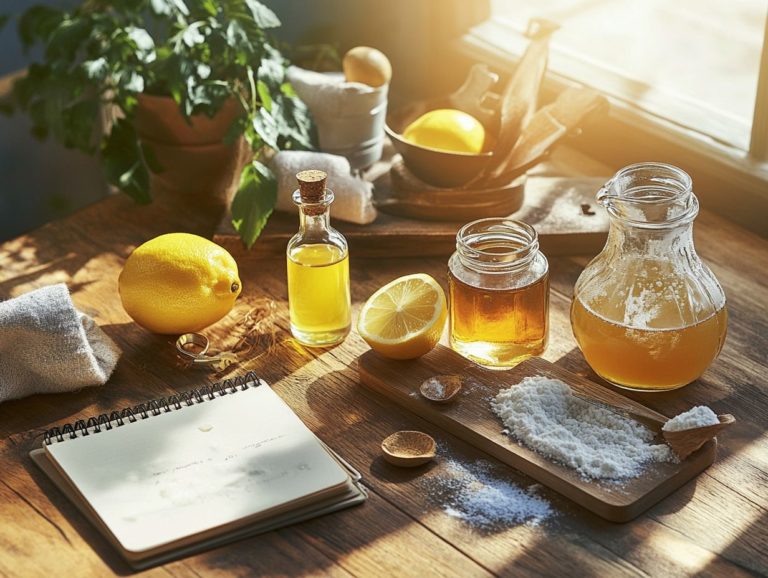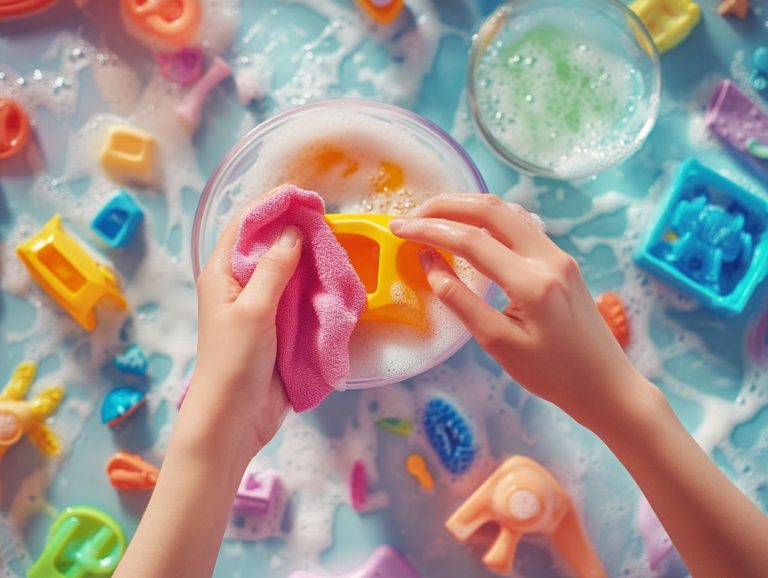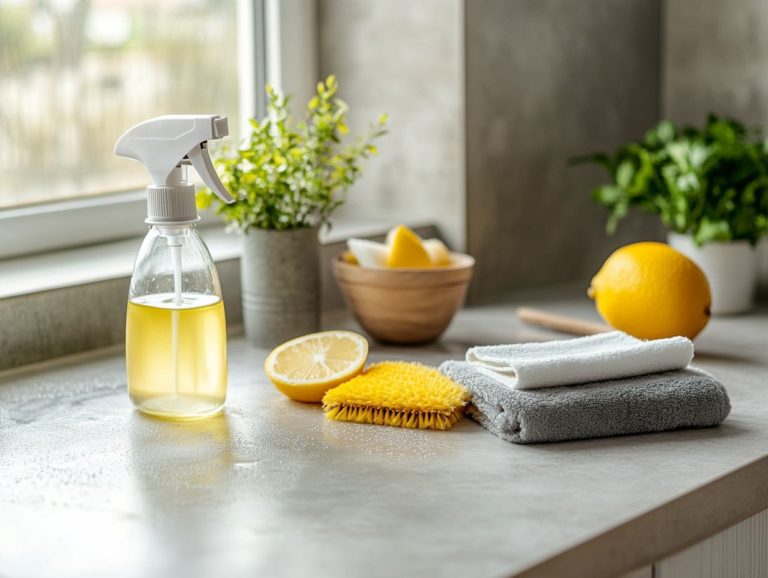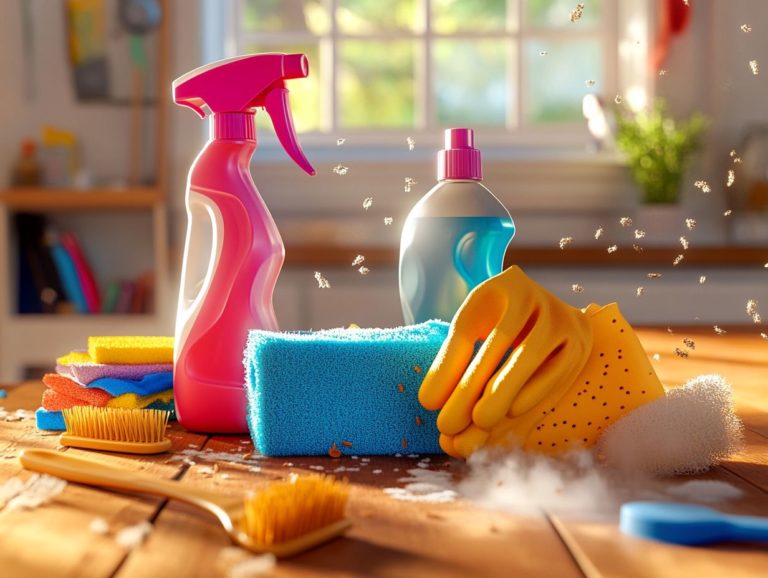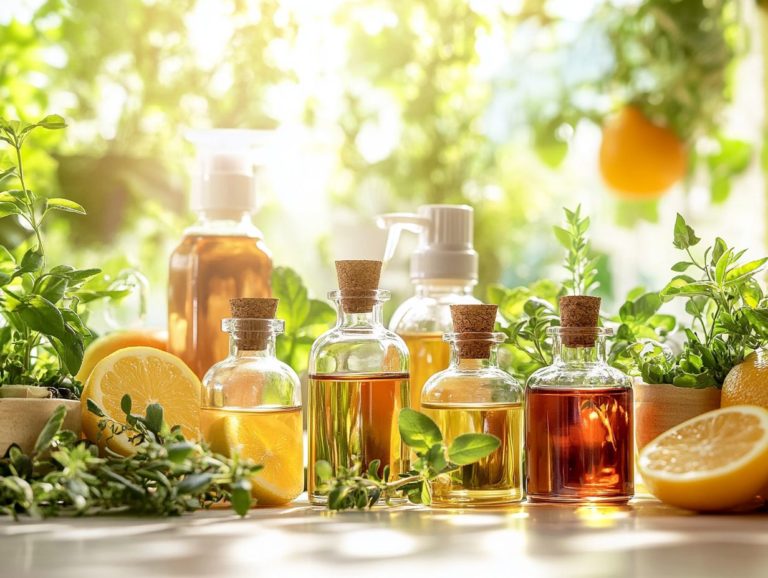How to Choose Safe Containers for Cleaners?
Selecting the appropriate containers for your cleaners is essential for ensuring both health and safety. The materials you choose can greatly influence the integrity of the cleaner and its performance. They also need to comply with FDA and other regulatory standards. Various container types plastic, glass, metal, and biodegradable options like those found at World Market and Ikea each offer unique advantages and considerations.
Get ready to discover the different types of containers available for your cleaning supplies! We will outline key factors to contemplate during your selection process and showcase exemplary safe container options to empower you in making informed decisions. Additionally, we will cover organization tips and proper labeling to maintain health safety.
Contents
- Key Takeaways:
- Why Is It Important to Choose Safe Containers for Cleaners?
- What Are the Different Types of Containers for Cleaners?
- What Are the Factors to Consider When Choosing Safe Containers for Cleaners?
- What Are Some Examples of Safe Containers for Cleaners?
- Frequently Asked Questions
- What types of materials are safe for storing cleaning products?
- Are plastic containers safe for storing cleaning products?
- Can I reuse containers that previously held food or other products for storing cleaners?
- What should I consider when selecting containers for cleaning supplies?
- Is it necessary to label containers used for storing cleaners and cleaning solutions?
- What should I do with empty containers after I have finished using the cleaner or cleaning products?
Key Takeaways:
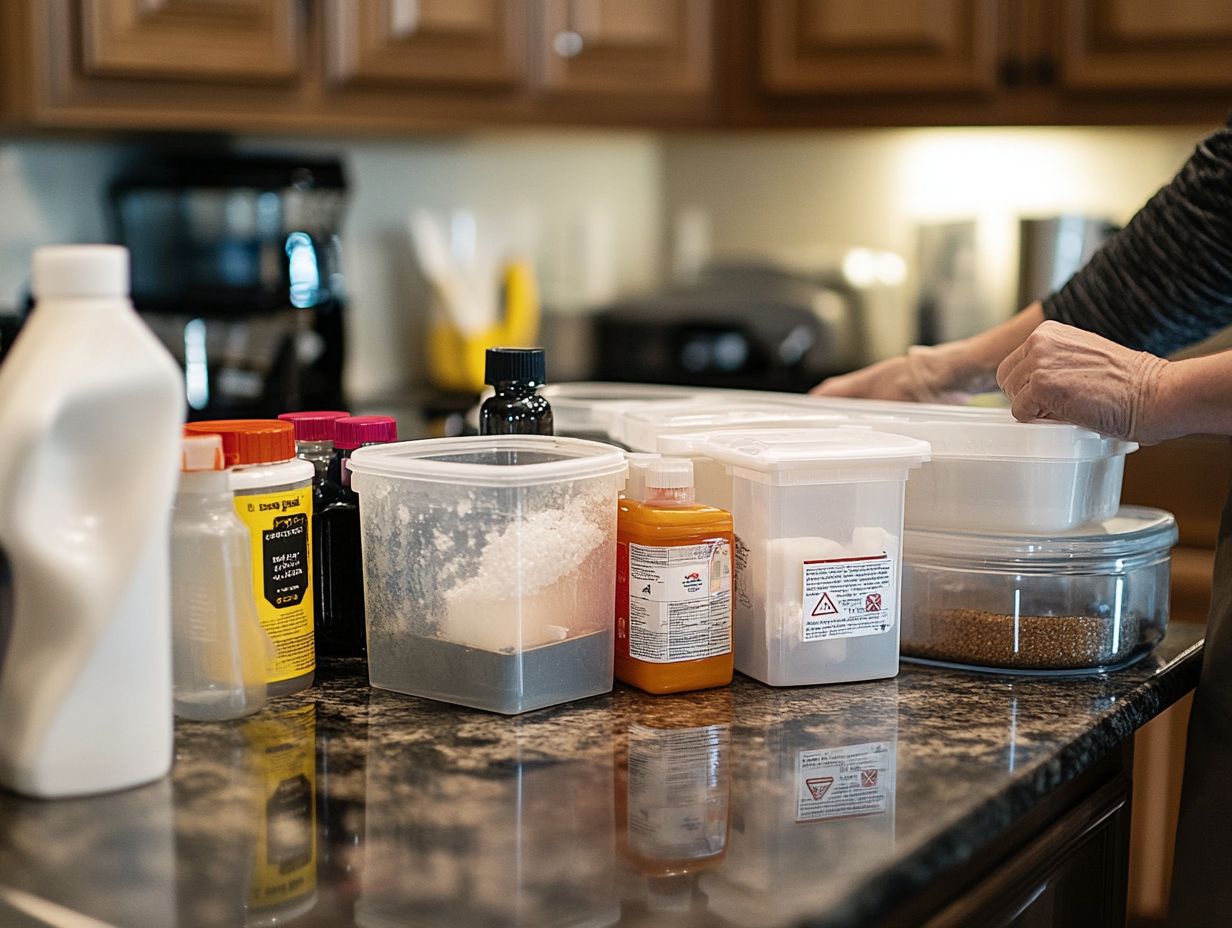
Why Is It Important to Choose Safe Containers for Cleaners?
Choosing safe containers for your cleaners is crucial don t compromise on safety! It is essential for maintaining health and safety in both household and professional environments. As awareness of hazardous waste and the risks associated with improper storage continues to grow, selecting containers that not only protect the contents but also adhere to regulatory standards is vital. This includes COSHH regulations (Control of Substances Hazardous to Health), OSHA guidelines (Occupational Safety and Health Administration), and FDA requirements.
Poor storage can lead to chemical spills or accidents. It can even pose dangers to children and pets, and may attract mice, which is why proper labeling is crucial for identifying hazardous materials. By understanding these factors, along with the importance of childproof storage, you’ll feel empowered to make informed choices that enhance safety and effectiveness in your cleaning practices.
What Are the Different Types of Containers for Cleaners?
Selecting cleaning supplies requires a keen understanding of the various types of containers available for cleaners. Each container type serves a specific purpose, bringing its own set of advantages and disadvantages.
For instance, plastic containers are lightweight and versatile, making them a popular choice found in many grocery stores. Glass containers, on the other hand, provide superior protection against chemical interactions, making them ideal for storing a range of cleaning solutions and food items.
Metal containers and biodegradable options offer unique benefits tailored to specific storage needs and eco-friendly practices. Stores like Container Store and Teavana provide a variety of such options. By familiarizing yourself with these choices, you can confidently select the best storage solutions that prioritize safety, convenience, and environmental consciousness.
1. Plastic Containers
Plastic containers are among your best bets for storing cleaning supplies, thanks to their lightweight and durable nature. They come in a variety of designs and sizes, adapting easily to both home and commercial settings. It s essential to choose plastic that s free from harmful chemicals like BPA (Bisphenol A) to ensure health safety, much like the standards set by the FDA.
While the convenience of plastic containers is hard to beat allowing for easy transport and stacking you can t ignore their impact on food freshness and safety. These containers often come with an airtight seal, sometimes featuring a rubber seal, that helps preserve food quality, keeping spoilage at bay and extending shelf life.
However, certain plastic materials can leach harmful substances into your food, especially when exposed to heat. This raises valid concerns about potential health risks. Therefore, while enjoying the practicality they offer, make it a priority to select high-quality, food-grade plastics to mitigate any adverse effects, particularly if you re using them as food containers for items like chipotle peppers in adobo sauce.
2. Glass Containers
Glass containers present an exceptional option for storing your cleaning solutions, thanks to their remarkable chemical resistance and durability. Unlike plastic, glass does not leach harmful substances like BPA, which means you can trust that the integrity of your cleaning products remains intact. Their aesthetic appeal also makes them very popular, making them a superb choice for both personal and professional settings.
Not only do glass containers preserve the freshness of your cleaning solutions for extended periods, but they also serve as eco-friendly alternatives that help diminish reliance on single-use plastics. The beauty of these containers lies in their potential for indefinite reuse, allowing you to embrace a more sustainable lifestyle while minimizing environmental waste. Their non-porous surface ensures that there s no reaction with the stored substances, keeping them effective over time. These containers are often recommended for bulk items and coffee storage for their ability to maintain food freshness.
This reliability not only enhances your cleaning results but also creates a safer environment by eliminating the risks associated with chemical contamination. As consumers like you become increasingly aware of their choices, the advantages of opting for glass storage become impossible to ignore. Popular brands like Ball jars are often used for their durability and visual appeal.
3. Metal Containers
Metal containers provide you with exceptional durability and strength, making them ideal for storing hazardous materials that require robust containment. In commercial settings, where spills or leaks can create significant safety hazards, choosing the right metal container is crucial. Opt for containers that resist rust and corrosion to guarantee long-lasting use. These containers are especially useful when adhering to safety rules and protective equipment guidelines.
Think of these containers as your reliable shield against unsafe spills, offering the protective qualities necessary for safe storage. In industries like pharmaceuticals and manufacturing, the demand for effective storage solutions is paramount. Metal containers not only protect the integrity of the materials within but also enhance overall storage safety by reducing the risks associated with chemical interactions and leaks.
Their sturdy construction and resistance to degradation provide you with peace of mind, knowing that even the most volatile substances are securely contained and shielded from environmental damage.
4. Biodegradable Containers
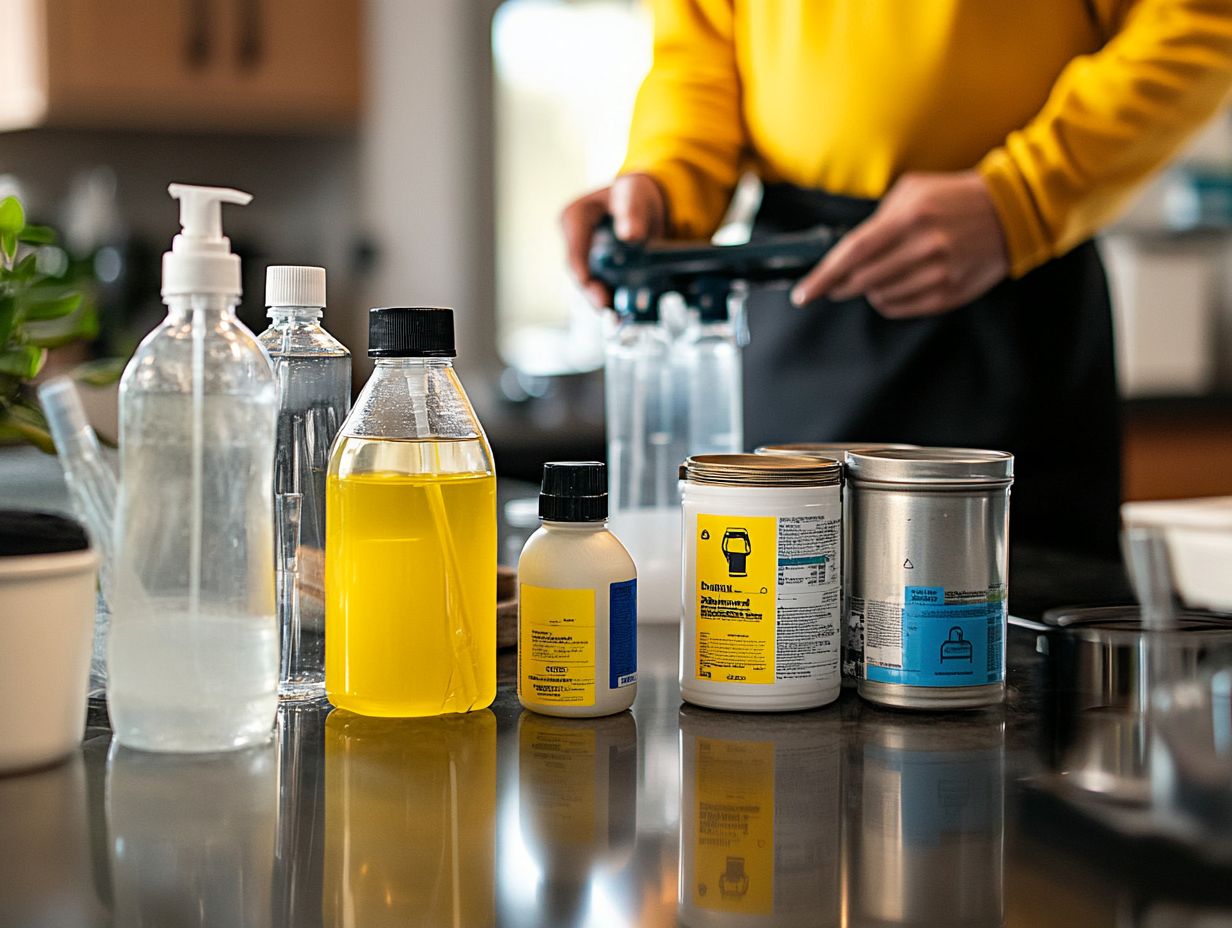
Biodegradable containers offer you a sustainable solution for storing cleaning supplies, perfectly aligning with your environmentally-conscious values. Crafted from materials that naturally break down, these containers provide an effective means to reduce plastic waste without sacrificing functionality. They’re gaining popularity in both home and commercial environments, embodying a greener approach to cleaning.
By opting for biodegradable containers, you not only contribute to the reduction of environmental pollution but also participate in a broader movement toward sustainability. These containers decompose into non-toxic components, significantly minimizing their environmental impact while supporting healthier ecosystems.
With increasing awareness of the perils posed by conventional plastics, switching to eco-friendly options is an easy way to help our planet. Act now to switch to biodegradable containers and play your part in saving our planet! As more brands adopt sustainable practices and consumers like you become more discerning in your choices, embracing biodegradable containers becomes a straightforward yet impactful step toward nurturing a cleaner, safer world for future generations.
What Are the Factors to Consider When Choosing Safe Containers for Cleaners?
When selecting containers for your cleaners, consider key factors for safety and functionality. Following guidelines from the National Poison Control and Bloodborne Pathogen Standard can help you make informed choices.
The materials used are crucial. Focus on their ability to withstand chemicals and their durability.
Also consider the sealability, size, and shape. These factors greatly affect how you store and organize your cleaning supplies.
By prioritizing these elements, you can boost the safety and efficiency of your cleaning routines. This ensures everything is in its place and ready for use, especially when handling cleaning chemicals and following Safety Data Sheet guidelines.
1. Materials Used
The materials for your cleaning containers are vital for safety and effectiveness. You can choose from glass, plastic, metal, and biodegradable materials.
Glass containers are non-reactive and keep chemical compounds intact, making them ideal for certain cleaners. Plastic is lightweight and shatterproof, but be cautious of harmful substances seeping into the contents.
Metals, especially stainless steel, offer great durability and corrosion resistance. They can be heavier and pricier, but high-quality options from brands like Teavana are worth the cost.
Biodegradable materials are an eco-friendly alternative that promotes sustainability. However, they might not protect against chemical degradation as well as traditional options.
2. Chemical Resistance
Choosing containers with good chemical resistance is crucial. Some materials can break down or react negatively when in contact with various cleaning chemicals.
For strong acids and solvents like hydrochloric acid or acetone, use specific plastics like high-density polyethylene (HDPE) or glass. The wrong choice could lead to leaks or degradation, posing serious safety risks.
Even basic cleaners containing bleach and ammonia need containers that can resist chemical reactions. Without proper protection, your storage solutions could compromise safety and effectiveness.
3. How Well It Seals
The seal of your container is key to keeping your cleaning supplies safe from contamination and spills. Air-tight seals, often created with rubber gaskets or seals, help maintain freshness and prevent leaks.
These seals protect your materials from outside elements and improve their shelf life. Types of seals include silicone gaskets and vacuum seals, each suited for specific storage needs.
For instance, vacuum sealing removes air from the container, reducing oxidation and helping your cleaning agents stay potent.
A reliable seal is vital for safety during transport or storage. Choosing the right sealing method ensures your cleaning supplies remain secure, fresh, and ready to use.
Don’t forget to label your containers properly to enhance health safety.
Size and Shape
The size and shape of your containers significantly affect how you store and organize your cleaning supplies. Choosing the right size ensures efficient space use and easy access.
The shape can help integrate storage solutions into your environment, whether at home or work. Following organization tips can further improve your storage strategies.
By considering size and shape, you can maximize space and enhance organization. For example, tall, narrow containers can free up floor space in closets or under sinks.
On the other hand, wide, flat bins work well on shelves in laundry areas or grocery stores for bulk items. Ensure each container complements the cleaning supplies you store inside.
Clear, labeled bins make finding items easy. Multi-compartment organizers are perfect for holding tools of various sizes.
Thoughtful storage solutions can create a clutter-free space, making your cleaning routine more efficient and enjoyable. Using food containers can also enhance the visual appeal of your area.
What Are Some Examples of Safe Containers for Cleaners?
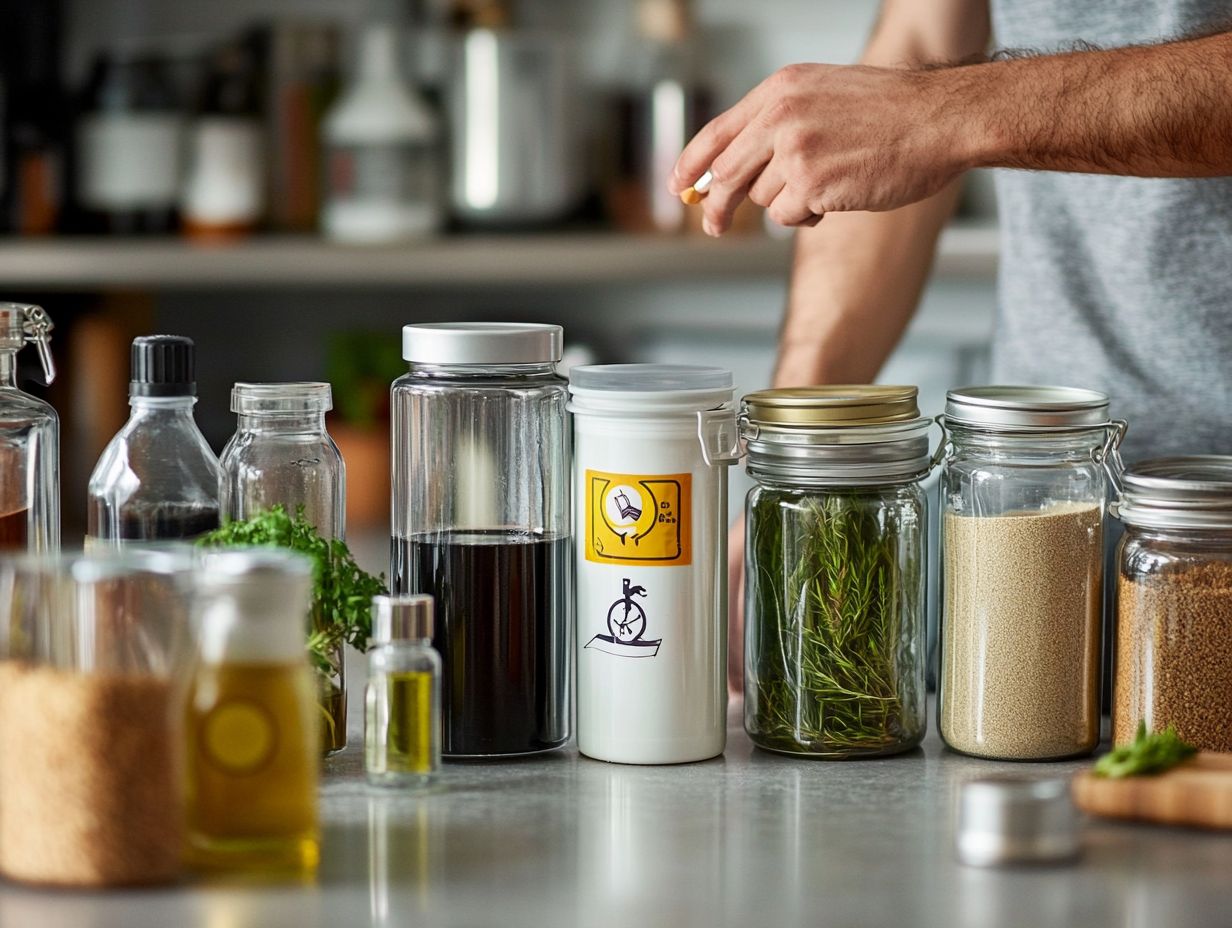
You have many options for safe containers for your cleaning supplies. Each type can meet your specific storage needs and style preferences.
For example, HDPE plastic bottles are durable and resistant, making them popular for various cleaners. If you prefer something stylish, glass mason jars look great and provide secure storage.
You can find glass jars at stores like World Market and Container Store. Stainless steel spray bottles are eco-friendly and perfect for those who value reusable options.
Lastly, biodegradable plastic containers are an excellent choice for environmentally-conscious consumers.
1. HDPE Plastic Bottles
HDPE plastic bottles stand out for their impressive strength and durability, making them an excellent choice for safely storing cleaning supplies.
With their remarkable resistance to impact, these bottles can confidently contain various chemicals without jeopardizing health safety or violating OSHA standards.
This exceptional resilience becomes particularly beneficial in both household and commercial settings, where accidental drops or spills are an inevitable reality. The non-toxic properties of HDPE ensure that harmful substances remain securely contained, safeguarding both users and the environment.
You’ll appreciate their lightweight design, which enhances accessibility and makes handling and transport a breeze. Plus, the material’s resistance to UV radiation means that your contents stay stable, even when basking in sunlight.
These containers are also BPA-free (Bisphenol A), ensuring further health safety. It’s clear why they are a favorite among eco-conscious shoppers!
Moreover, these bottles are recyclable, aligning perfectly with sustainability efforts. It’s no wonder they ve become the go-to choice for environmentally-conscious consumers across a range of applications, from food storage to personal care products and industrial chemicals.
Consider making the switch today!
2. Glass Mason Jars
Glass mason jars serve as a great choice for storing your cleaning supplies, providing an impressive barrier against chemical interactions while preserving the freshness of their contents.
Their transparent design not only adds a touch of elegance to your storage but also allows you to effortlessly identify what s inside at a glance.
These jars don t just shield against potential chemical reactions; they also play a critical role in maintaining the potency and longevity of your various cleaning supplies.
With the airtight seal many glass mason jars offer, moisture and air are kept at bay, safeguarding the effectiveness of the substances within for extended periods. This makes them perfect for coffee storage as well.
Easily cleaned and reusable, these jars make for an eco-friendly choice that aligns with sustainable living practices. Whether you re storing homemade cleaners or natural disinfectants, using glass mason jars elevates both organization and safety, transforming your storage space into a tidy and efficient haven.
Jump on board with this sustainable option!
3. Stainless Steel Spray Bottles
Stainless steel spray bottles present an eco-friendly and reusable alternative for containing your cleaning supplies, offering remarkable durability and resistance to corrosion.
They are the perfect choice for those who are environmentally conscious and eager to reduce waste while safeguarding their cleaning supplies. These bottles are often available at retailers like Teavana and National Poison Control.
By opting for these bottles, you embrace a sustainable solution that not only minimizes plastic waste but also preserves the integrity of your various cleaning formulas over time.
Unlike their plastic counterparts, stainless steel bottles won t leach harmful chemicals, ensuring that the cleanliness and effectiveness of your supplies remain intact. They also comply with regulations set by FDA.
Their robust design is built to withstand the demands of daily use, making them a wise investment for anyone who values longevity in their cleaning arsenal. Choosing stainless steel means you re making a conscious choice for a cleaner planet while enjoying a reliable and efficient way to tackle your cleaning tasks.
This is especially important for cleaning products used in both household and commercial settings. Explore these options for a safer, more sustainable home!
4. Biodegradable Plastic Containers
Biodegradable plastic containers offer a sustainable storage solution for cleaning supplies. They break down naturally, significantly reducing your environmental impact. They effectively maintain the integrity of your cleaning solutions while encouraging environmentally friendly habits.
These innovative containers are not just practical; they play a crucial role in waste reduction efforts. As more consumers become environmentally conscious, the demand for these containers is surging, making them a compelling alternative to traditional plastic options. Organizations like OSHA and California’s environmental agencies have been promoting their use for safer environments.
Crafted from renewable resources, biodegradable plastic containers represent a wise choice for eco-friendly homes and businesses alike. Beyond storage, you can use them for various applications, including food storage and personal care products, ensuring safety without sacrificing sustainability. Their widespread adoption is a proactive step you can take toward a greener future, much like the initiatives led by Bloodborne Pathogen Standard and SDS guidelines.
Frequently Asked Questions
What types of materials are safe for storing cleaning products?
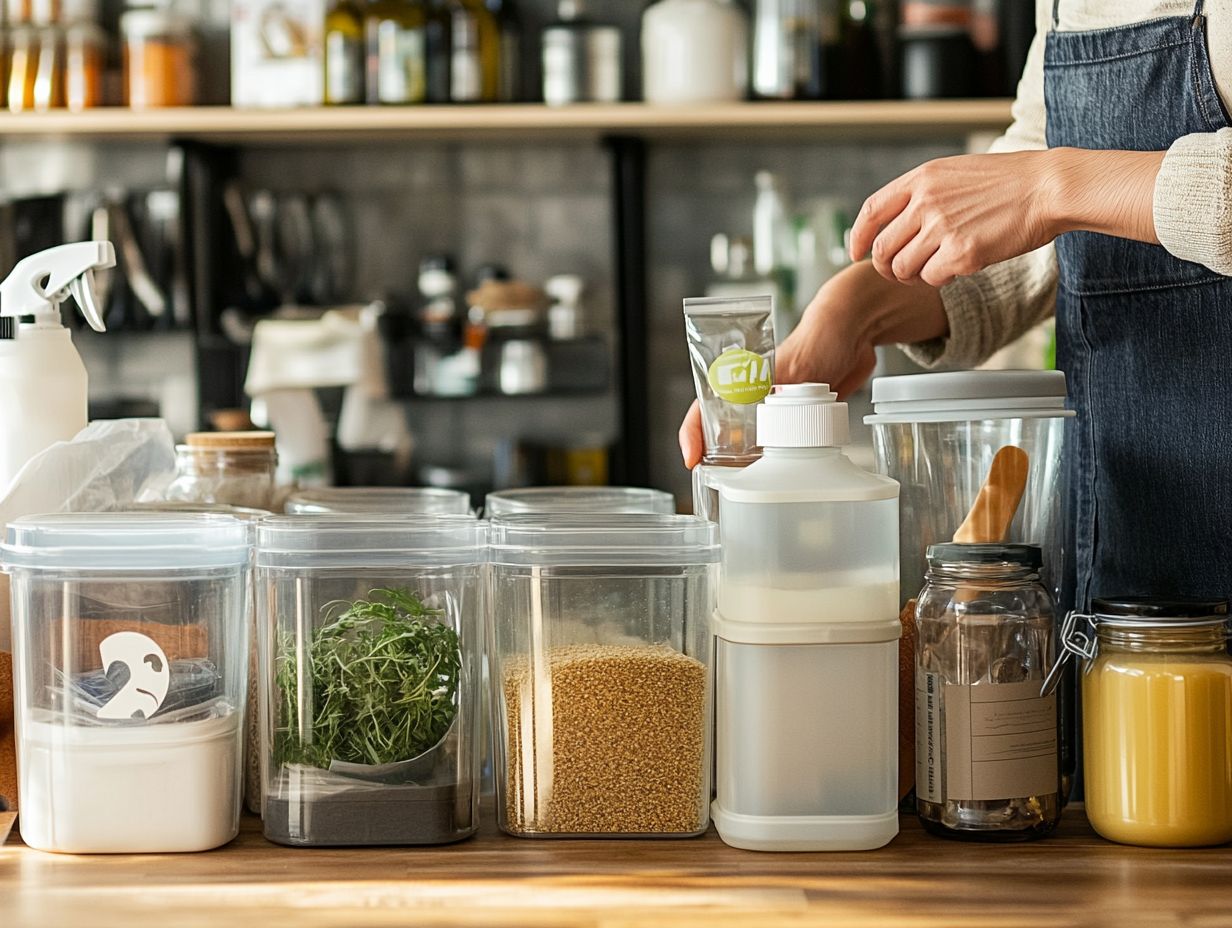
Glass, stainless steel, and high-density plastic are all safe materials for storing cleaners. These materials will not react with the chemicals in the cleaners and will not leach harmful substances into the products. BPA-free containers (a harmful chemical often found in plastics) are also recommended for safety.
Are plastic containers safe for storing cleaning products?
While some types of plastic may be safe for storing cleaners, it is important to check the recycle code on the bottom of the container. Codes 1, 2, and 5 are generally considered safe, while codes 3, 6, and 7 should be avoided as they may leach harmful chemicals into the products. Always refer to OSHA guidelines for proper storage practices.
Can I reuse containers that previously held food or other products for storing cleaners?
No, it is not recommended to reuse containers that previously held food or other products for storing cleaners. These containers may still contain traces of the previous product, which could react with the cleaning chemicals and cause harmful fumes or reactions. Always use dedicated storage containers and adhere to COSHH regulations.
What should I consider when selecting containers for cleaning supplies?
In addition to the material of the container, such as glass containers, it is important to consider the size and shape of the storage container, as well as the type of closure or lid, like a rubber seal. Containers with tight-fitting, air-tight lids and smaller sizes are generally safer for storing cleaning supplies. Furthermore, using BPA-free containers can enhance health safety when dealing with cleaning chemicals.
Is it necessary to label containers used for storing cleaners and cleaning solutions?
Yes, labeling containers is crucial for safety! Always label containers used for storing cleaners with the name of the product and any precautionary statements or instructions. Proper labeling according to OSHA and COSHH regulations will help prevent accidental ingestion or misuse of the product. Additionally, ensuring compliance with FDA guidelines for cleaning solutions and proper labeling can further enhance safety measures.
What should I do with empty containers after I have finished using the cleaner or cleaning products?
Empty containers should be properly disposed of as hazardous waste according to the instructions on the product label. If there are any remaining residues of the cleaner or cleaning products, it is important to rinse the container thoroughly before disposal to prevent any potential reactions with other substances. Following the guidelines of the National Poison Control and California regulations ensures safe disposal practices!

